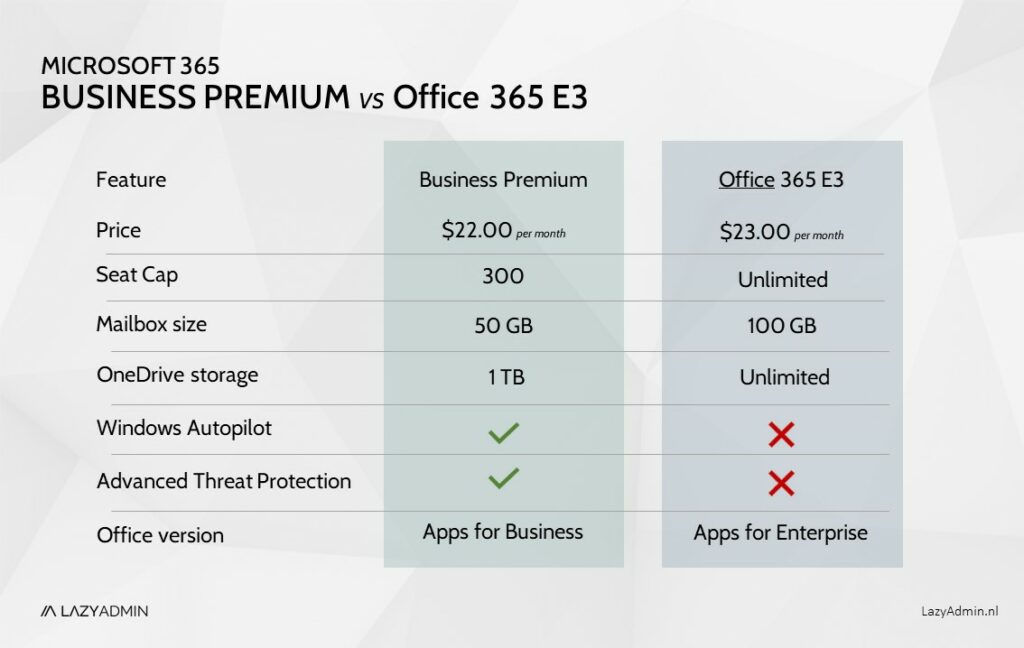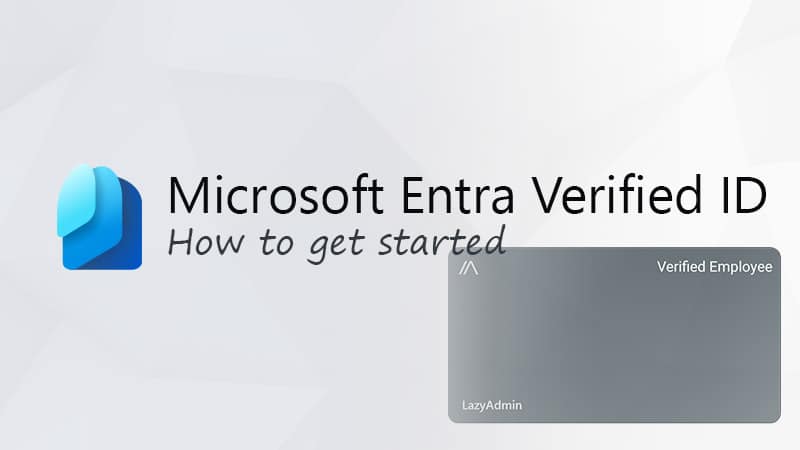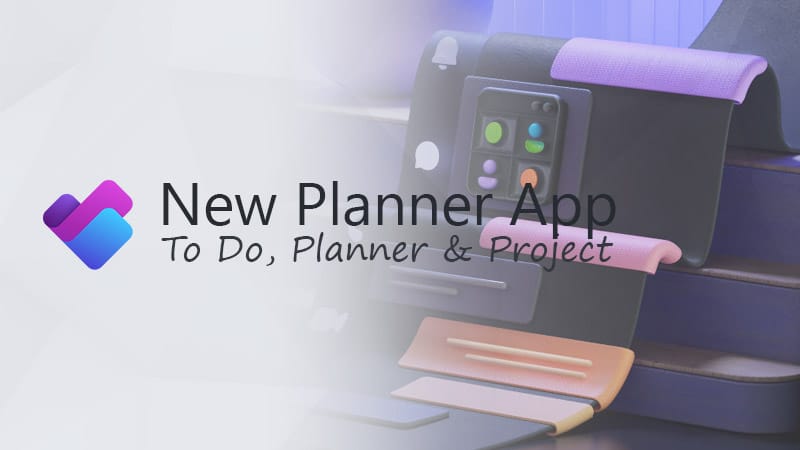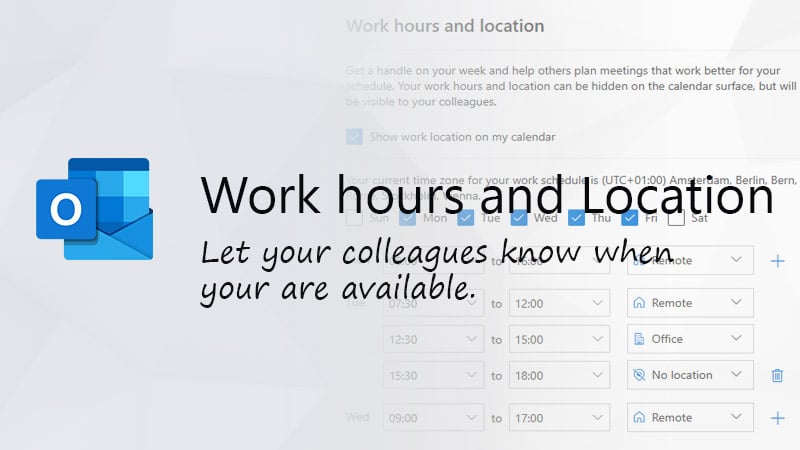Microsoft 365 Business Premium and Office 365 E3 are both around $22 per month, so which one should you choose? Business Premium is one of the new plans that Microsoft launched after rebranding their old Business Plans, and it’s a really interesting one.
Business Premium has some limitations compared to Office 365 E3, but in return, it comes with all the security and management tools that you really want to have these days.
In this article, we are going to take a look at those differences. Also if you already have Office 365 E3, I will give you some tips and tools to help you work out if switching plans is interesting.
Important note!
This article is about Microsoft 365 Business Premium and Office 365 E3, NOT Microsoft 365 E3.
You can find the comparison between Business Premium and Microsoft 365 E3 here
Office 365 E3 vs Business Premium
Microsoft Business Premium is a business line plan and Office 365 E3 is an Enterprise plan. So what does that mean? To start with, business plans are limited to 300 seats. If you have more than 300 users, then Business Premium isn’t interesting for you, because the advanced security features won’t work if you have more than 300 users.

Microsoft 365 Apps for Business vs Enterprise
One of the differences that are hard to find online, is the difference between the two Office versions that you get with the two plans. Microsoft 365 Business Premium comes with Microsoft 365 Apps for Business whereas Office 365 E3 gives you Microsoft 365 Apps for Enterprise.
Note
Microsoft added new plans without Teams wich are only available in the European Union. These plans are less expensive. Read everything about it in this article
Microsoft 365 Apps for Business and Enterprise are not the same and the limitation of Apps for Business can really be a deal-breaker for some large companies. Features that are not available in Apps for Business are:
- Database Compare
- Excel Spreadsheet Compare
- Excel Spreadsheet Inquire
- Group Policy support
- Power Map for Excel
- Power Query for Excel
- Power View for Excel
- Tap to find and reuse content
If only are few users need one of the advanced Excel features, then you can buy Microsoft 365 E3 licenses for those users only. But when you need Group Policy support, then Microsoft Business Premium isn’t an option for you.
SharePoint Plan 1 vs Plan 2
With Microsoft 365 Business Premium you get SharePoint Plan 1 and with Office 365 E3 SharePoint Plan 2. The main difference between the two is the amount of storage that your users get with OneDrive, 1TB vs Unlimited.
The amount of storage that you get for SharePoint is for both plans the same, 1 TB + 10 GB per user. So when you have 100 users, that would be an extra 1 TB of storage.
But there are also a couple of features in Plan 2 that can be really interesting for Enterprise organizations, Data Loss Prevention, enhanced search options, and In-Place hold. The first helps you to protect sensitive information, the latter prevents editing or deleting of data.
| SharePoint Plan 1 | SharePoint Plan 2 | |
|---|---|---|
| Included in | Microsoft 365 Business Premium | Office 365 E3 |
| OneDrive Storage Limit | 1 TB | Unlimited (25TB+) |
| SharePoint Storage Limit | 1 TB + 10 GB per user | 1 TB + 10 GB per user |
| Data loss prevention | No | Yes |
| In-Place hold | No | Yes |
| Enhanced Search Features | No | Yes |
Good to know about the unlimited OneDrive storage, is that you will get 5 TB to start with. If you are running out of space, you can contact Microsoft which will then increase the limit to 25 TB. You can’t go larger than the 25 TB limit. So you might wonder where the unlimited part is. If you need more than 25 TB, then Microsoft will create a personal SharePoint site for you, which is also limited to 25 TB.
Exchange Online Plan 1 vs Plan 2
Microsoft 365 Business Premium comes with Exchange Online Plan 1, and Office 365 E3 with Plan 2. Again the main difference is in the amount of storage that you get. But there are also some additional features in Plan 2.
Other features that you get with Plan 2 are In-Place Hold and Data loss prevention (DLP).
| Exchange Online Plan 1 | Exchange Online Plan 2 | |
|---|---|---|
| Included in | Microsoft 365 Business Premium | Office 365 E3 |
| Mailbox Limit | 50 GB | 100 GB |
| Online Archive Limit | 1.5 TB | 1.5 TB |
| Data loss prevention | No | Yes |
| In-Place hold | No | Yes |
On-Premise Services
With Enterprise E3 you can use the user license in a hybrid environment. This means that the license can be used for both Exchange Online and the on-premise Exchange server. The same goes for SharePoint. Business Standard users can only use Online Services.
Group Policies
Larger organizations use Group Policies to control (office) applications within a domain. This is only supported by the Enterprise plans. So without GPO support, your IT department can’t manage the Office application (setting security options, user preferences, template folders, etc).
There is some GPO support with the Business plans, but that is limited to web apps and privacy policies.
Data Loss Prevention and Compliance
The Enterprise plans come with all the features you need to prevent data loss and to make sure you are compliant with all the regulations. DLP policies allow you to set rules to get warned or to prevent sharing of Personal Identification Information or Bank and CreditCard Numbers.
Also, the In-Place Hold and Litigation Hold can be really important features. If your company deals with a lot of legal cases then these features allow you to collect all the evidence you need.
Support
While Office 365 has really good uptime, an issue can always occur. With Office 365 Enterprise plans you get 24/7 support for all issues. But with Business Premium you can only call for Critical issues.
The Advantage of Microsoft 365 Business Premium
So you might wonder what makes Microsoft 365 Business Premium interesting. Well, Business Premium offers you a wide range of tools to protect your business against cyber threats and to manage your endpoints.
Endpoint Manager gives you a couple of tools to manage your mobile devices and Windows 10/11 computers:
- Microsoft Intune – Manage mobile devices and Windows 10 / 11 computers
- Configuration Manager – Deploy apps, software updates, and OS updates to your computers
- Windows Autopilot – Automatically roll out new computers based on user role
Other advanced threat protection tools that are included in Business Premium are:
- Microsoft Defender for Office 365 – Protects against phishing links, ransomware, and other zero-day threats
- App Protection for Office Mobile Apps – Restrict copying company data to unauthorized apps
- Information Rights Management – Control who has access to company information
- Microsoft Defender – Protect your Windows 10 / 11 computers against malware and viruses
- Conditional Access – Only apply MFA when needed
Microsoft 365 Business Premium vs E3 Comparison
I have listed all the features in the table below to help you compare Microsoft 365 Business Premium vs E3
| Microsoft 365 | ||
| Business Premium | Office 365 E3 | |
| Annual commitment | $22.00 p/m | $23.00 p/m |
| monthly commitment | $26.40 p/m | $27.60 p/m |
| Core Details | ||
| Seat Cap | 300 | Unlimited |
| Office Apps | ||
| Install Office on 5 Devices | ||
| Office Online | ||
| Excel Power Query and Power Pivot | ||
| Standard Services | ||
| Onedrive Storage | 1 TB | Unlimited |
| Exchange | Plan 1 | Plan 2 |
| Exchange Online Mailbox storage | 50GB | 100GB |
| Exchange Online Archive Storage | 1.5TB | 1.5TB |
| SharePoint | Plan 1 | Plan 2 |
| Teams | ||
| Yammer | ||
| Business Apps | ||
| Planner | ||
| Staffhub | ||
| Flow | ||
| PowerApps | ||
| Forms | ||
| To-Do | Plan 1 | Plan 2 |
| Stream | Plan 1 | |
| Microsoft Bookings | ||
| Insights by MyAnalytics | ||
| Advanced Services | ||
| Azure Active Directory P1 | ||
| Azure Information Protection Plan 1 | ||
| Active Directory Intergration | ||
| Azure Rights Management | ||
| Microsoft Intune | ||
| Support for shared computer activation | ||
| eDiscovery, Litigation Hold, Retention Policies | ||
| SharePoint eDiscovery, DLP & Insights | ||
| Advanced Threat Analytics | ||
| Microsoft Defender for Office 365 | ||
| Microsoft Defender for Cloud Apps | ||
| Windows 10/11 | ||
| Windows 10/11 | Pro | |
| Windows Virtualization Rights | ||
| Windows Autopatch | ||
| Windows Autopilot | ||
| Exploit Guard | ||
| Application, Credential, Device Guard | ||
| Defender for Business | ||
| More info | More info | |
| Buy | Buy | |
Switching from Office 365 E3 to Microsoft Business Premium
The advanced threat protection tools that come with Business Premium can really help you protect your tenant and IT environment against cyber security threats. But if you already have Office 365 E3, then you really need to investigate if you can make the switch.
Group Policy support is for most larger organizations really a requirement. It helps you with configuring and protecting Office apps (by disabling macro for example). Officially GPOs are not supported in Office 365 Business, but if you search online you will find that in most cases it just works.
As an alternative, you could also use the Office Deployment Tools to create a configuration with all the settings that you require. Not as good as a GPO, but might be sufficient.
OneDrive and Exchange Online
Make sure that you check the current OneDrive and mailbox sizes. Most users won’t exceed the 1 TB OneDrive limit, but the 50 GB mailbox limit is easily reached. You can use this PowerShell report to check the mailbox sizes in your tenant and this PowerShell report for OneDrive.
Wrapping Up
Microsoft 365 Business Premium is really an interesting alternative to Office 365 E3. It gives you a lot of powerful tools to protect your tenant and manage your endpoints.
Make sure that you check if any of the limitations won’t affect your business. The Excel limitations can be bypassed by buying Microsoft 365 E3 licenses for those users, but this license will cost $36 per user.
If you have any questions or spot something wrong in the comparison, then please drop a comment below.





PowerQuery/PowerPivot is included with all M365 plans that have Excel now. https://support.microsoft.com/en-us/office/where-is-power-pivot-aa64e217-4b6e-410b-8337-20b87e1c2a4b?ui=en-us&rs=en-us&ad=us
The article you are linking to is from 2019. You can find the latest updated service description here.
I am confused on DLP. Business Premium states no DLP for Exchange or Sharepoint due to plan level, but has DLP for Office 365. What is the difference? I cannot find a good comparison.
It’s always a challenge to find those kinds of details. If I look at the plan details for Business Premium then DLP for emails and files is included (page 4). But I can’t find the complete service description at the moment.
I believe a big difference i noticed is that business premium nowadays does not support the Office CDN for storing templates in sharepoint library. This is something you need to consider when choosing office premium versus enterprise E3.
https://learn.microsoft.com/en-us/sharepoint/organization-assets-library.
Microsoft is not very clear about this, only metioned something about powerpoint online, but i noticed recently that users who switched to the business premium plan is not seeing the update templates any more
Thank you for Posting. I see this was posted Last year. Might you have the updates sheet.
Thanks for posting this!
I think Business Premium is limitted for 300 users.
This mean that this licens is only for small businesses
Correct, limited to 300 seats, but you can extend with E3 licenses if you need more.
Thanks for posting this
I think Intune is available in E3 too
Intune is nog include in Office 365 E3. It’s included in Microsoft 365 E3: source.
I think that the Microsoft 365 Business Premuim also includes the Windows 10 Business License as well.
It also seems to include the Defender for Endpoint Business.
Thanks for putting this together. Just an FYI: Litigation hold is not in Business Premium
According to the PDF license overview from Microsoft for small businesses, it should be part of Business Premium. Do you have a link to a service description that says otherwise? Would love to sort it out.
Really appreciate the information you’ve presented!!! Exactly what I was looking for.